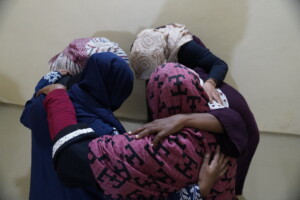Pricey school supplies, transport: South Darfur postpones start of schools
The increased transportation tariffs in Sudan have led the government of South Darfur to decide to postpone the start of the school year for the basic and higher secondary education for a week.
 A school in eastern Jebel Marra, in Arbe village (RD)
A school in eastern Jebel Marra, in Arbe village (RD)
The increased transportation tariffs in Sudan have led the government of South Darfur to decide to postpone the start of the school year for the basic and higher secondary education for a week.
Teacher Mohamed Abdallah attributed the reason of the postponement to the deteriorated economic conditions in Sudan, and especially the hike of fuel prices which caused a nationwide rise of public transportation tariffs.
“In South Darfur the price rose from 3 Pounds to 5 Pounds ($0.10 to $0.18), and pamphlet schoolbooks and uniforms became more expensive as well,” the teacher explained.
School tuition fees rose, too, which school administrations fear might lead to discontent and protests. “Most families have more than one student in either of the two stages, and have to take care of their tuition, school supplies and food.”
Salaries delayed
A number of teachers in the localities of South Darfur have not received their salaries, the teacher continued, because of computation problems of the salary administration.
The teacher played down the possibility that the situation will be addressed within a week. “Despite the presence of teachers and schools, the economic conditions will be the greatest threat to the school year.”
Parents of school-going children in Khartoum have also complained about the rising costs of transportation and school supplies for their children. Also a caller from El Gedaref state told Radio Dabanga that a number of pupils were unable to go to school for one day because of the lack of transportation and the doubling of prices.
School supplies
The price hikes are also felt in Sudan’s central-eastern El Gezira state, where families have denounced the expensive school supplies in the market of Wad Medani. Because of the beginning of the new school year, prices of school uniforms range between SDG130 ($4.61) and SDG 220 ($7,81). Prices of bags range between SDG 220 and SDG 550* according to sizes and quality.
A teacher told Radio Dabanga that the price of a dozen brochures has amounted to SDG 120 within the subsidized exhibitions and SDG 130 in the markets. “The increases are unprecedented and exaggerated,” she said, and called on the state to support the schools in obtaining supplies.
“Especially now that the distribution of textbooks is no longer the same as it used to be in the past. Every five students share one book now.”
Price hikes
The economy in Sudan has hit rock bottom. Khartoum remains crippled after the loss of millions in oil revenues since South Sudan seceded in 2011. The country needs hard currency to import basic commodities from abroad. Apart for skyrocketing prices, the majority of the Sudanese are suffering from continuing fuel shortages, and a scarcity of wheat and medicines, and power and drinking water outages.
In early January, inflation spiralled upwards after Khartoum implemented far-fetching austerity measures in compliance with the 2018 national budget. In an attempt to halt the plummeting Pound on the parallel forex market, the customs rate of the US Dollar was raised from SDG 6.7 to an indicative SDG 18. The prices of basic commodities, such as bread, doubled, the prices of some medicines even tripled.
In response, Sudanese across the country took to the streets in protest against the soaring prices, and a shortages of clean drinking water. Police used tear gas and live bullets to disperse the demonstrators. Many leaders of opposition parties were detained, and newspapers were instructed to not to cover the price hikes or the protests.
* Based on the indicative US Dollar rate quoted by the Central Bank of Sudan











 and then
and then